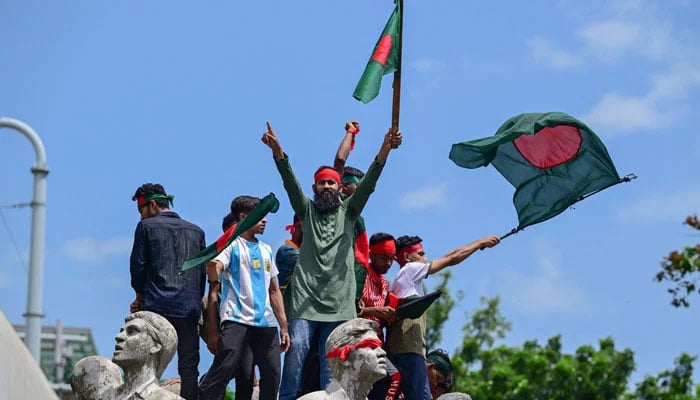Bangladesh revolt
Some critical questions since the transformation of East Pakistan into Bangladesh remain unsolved even today
A giant statue is being shown on TV screens, with some angry people climbing and trying to knock it down with hammers. This statue belongs to Sheikh Mujibur Rahman, the founding father of Bangladesh, who played a leading role in separating the eastern part of Pakistan in 1971.
Some critical questions since the transformation of East Pakistan into Bangladesh remain unsolved even today. However, the subject of my column today is to analyze the decades-long rule of Sheikh Hasina Wajid, the daughter of Sheikh Mujibur Rahman and former prime minister of Bangladesh. She was known as a dictator in the guise of a democratic leader whose politics revolved around Pakistan-bashing to please India.
After the 1971 war, Sheikh Mujibur Rahman took over power as the first prime minister of Bangladesh, but a few years later in 1975, he was murdered along with his family. At that time, his 27-year-old daughter, Hasina, was out of the country. She later left no stone unturned in promoting anti-Pakistan sentiments throughout her political career.
The atmosphere of unrest and chaos that has arisen in Bangladesh in recent days initiated in the form of protests by university students. Reportedly, under the quota system prevailing in the Hasina government, the criterion of securing a government job was not merit but depended on the contribution of the candidate’s fathers and grandfathers in the war against Pakistan in 1971.
The students’ reservations about the job quota system should have been considered calmly, but PM Hasina declared the protesting students as Pakistani agents. She took the stance that all those protesting on the streets were Razakars (volunteers) of Pakistan in the guise of students and the supporters of Pakistan do not deserve any mercy in Bangladesh.
During the 1971 era, there were people in East Pakistan who wanted to keep Pakistan united. They were known as Razakars, collaborators who sided with Pakistan voluntarily. However, after the establishment of Bangladesh, the word ‘Razakar’ was turned into a slur there. During Hasina’s era, whenever a political rival had to be criticized, they were labeled as ‘Razakars’ – in other words, Pakistani agents.
Recently, several video clips went viral on social media, in which the students are chanting, “Who am I?” Who are you? Razakar, Razakar!”. And then they ask who calls us this. In response to this, all the students chant: “Sairachar-sairachar” (doctator in Bengali). In this way, the courageous youngsters of Bangladesh started to challenge Hasina’s dictatorship.
It is a bitter fact of human history that revolution demands blood. This struggle of Bangladeshi students also proved to be very bloody in the sense that dozens of innocent lives were sacrificed in the recent protest; indiscriminate shots were fired at the protesters and the brutal use of force was seen to crush the protests.
According to Vedic astrology, the year 2024 is the year of karma, during which every powerful ruler of the world has to reap the fruits of their past deeds. In one of the previous columns, I had warned that pro-establishment forces are facing defeat in different countries throughout the world. Sheikh Hasina won the election held in January this year, but despite her long rule, she finally met a terrible end in the year of Karma.
What we have seen in Bangladesh today should be a lesson to all rulers to make the welfare of the people their priority without any bias and not to act in the arrogance of power. In my view, the people of Bangladesh do not want to promote any more hatred in their country. Let’s hope that the people of Bangladesh and Pakistan forget the bitterness of the past and join hands to strengthen a relationship of mutual respect and bilateral cooperation with each other.
The writer is a member of the National Assembly and patron-in-chief of the Pakistan Hindu Council.
He tweets/posts @RVankwani
-
 What You Need To Know About Ischemic Stroke
What You Need To Know About Ischemic Stroke -
 Shocking Reason Behind Type 2 Diabetes Revealed By Scientists
Shocking Reason Behind Type 2 Diabetes Revealed By Scientists -
 SpaceX Cleared For NASA Crew-12 Launch After Falcon 9 Review
SpaceX Cleared For NASA Crew-12 Launch After Falcon 9 Review -
 Meghan Markle Gives Old Hollywood Vibes In New Photos At Glitzy Event
Meghan Markle Gives Old Hollywood Vibes In New Photos At Glitzy Event -
 Simple 'finger Test' Unveils Lung Cancer Diagnosis
Simple 'finger Test' Unveils Lung Cancer Diagnosis -
 Groundbreaking Treatment For Sepsis Emerges In New Study
Groundbreaking Treatment For Sepsis Emerges In New Study -
 Roblox Blocked In Egypt Sparks Debate Over Child Safety And Digital Access
Roblox Blocked In Egypt Sparks Debate Over Child Safety And Digital Access -
 Savannah Guthrie Addresses Ransom Demands Made By Her Mother Nancy's Kidnappers
Savannah Guthrie Addresses Ransom Demands Made By Her Mother Nancy's Kidnappers -
 OpenAI Reportedly Working On AI-powered Earbuds As First Hardware Product
OpenAI Reportedly Working On AI-powered Earbuds As First Hardware Product -
 Andrew, Sarah Ferguson Refuse King Charles Request: 'Raising Eyebrows Inside Palace'
Andrew, Sarah Ferguson Refuse King Charles Request: 'Raising Eyebrows Inside Palace' -
 Adam Sandler Reveals How Tom Cruise Introduced Him To Paul Thomas Anderson
Adam Sandler Reveals How Tom Cruise Introduced Him To Paul Thomas Anderson -
 Washington Post CEO William Lewis Resigns After Sweeping Layoffs
Washington Post CEO William Lewis Resigns After Sweeping Layoffs -
 North Korea To Hold 9th Workers’ Party Congress In Late February
North Korea To Hold 9th Workers’ Party Congress In Late February -
 All You Need To Know Guide To Rosacea
All You Need To Know Guide To Rosacea -
 Princess Diana's Brother 'handed Over' Althorp House To Marion And Her Family
Princess Diana's Brother 'handed Over' Althorp House To Marion And Her Family -
 Trump Mobile T1 Phone Resurfaces With New Specs, Higher Price
Trump Mobile T1 Phone Resurfaces With New Specs, Higher Price




